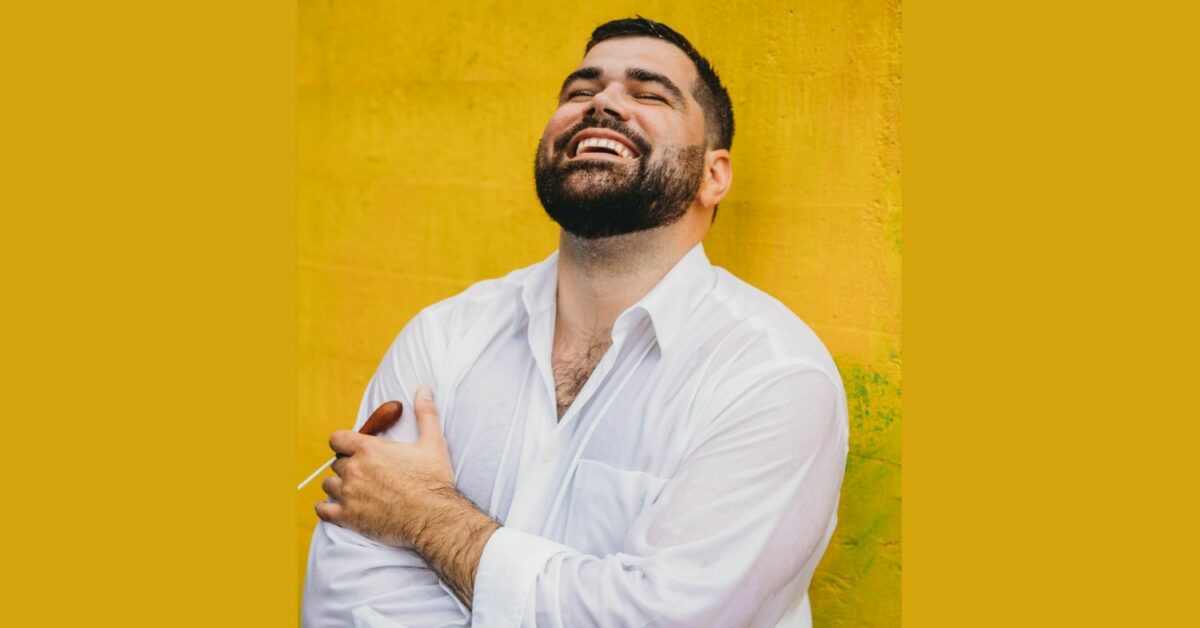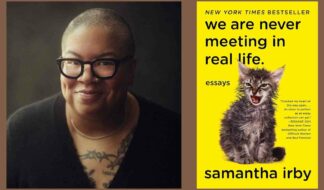How a Conductor from Michigan Is Creating Safe Spaces for the Queer Musician Community in Deep Red Florida
As a leader, Kevin Fitzgerald prioritizes service and advocacy

Chances are, if you were to close your eyes and picture an orchestra conductor, you’d likely conjure up a stereotypical image: “old, white man in a tuxedo with gray hair,” says conductor Kevin Fitzgerald. “These are the images burned into our collective consciousness.”
It’s an image the Brighton, Michigan native, Interlochen Arts Academy alumnus and out gay associate conductor of the Jacksonville Symphony would like to see fade away. It’s an image that distracts from a true evolution happening globally in the field of conducting, one that he says has largely been led by women, who are increasingly stepping atop podiums in front of musical ensembles big and small around the world. “It’s been really good for men, too, because I think men have been burdened a little bit by this super masculine, serious kind of traditionally authoritative figure that we all imagine,” he tells Pride Source in a recent interview. “I think now that stereotype of what conductors have been has been shattered, essentially by women coming forward. It allows men to be more authentic.”
Authenticity for Fitzgerald includes openly living the life he shares with his husband. But even living in places like Texas and now, Florida, where politicians are still riding a wave of anti-LGBTQ+ sentiment that has grown in recent years across conservative pockets of the U.S., he is happy to report that he’s felt affirmed and supported throughout his career. The fact is that many queer people live in red states, red corners of blue states and everywhere in between. It’s another stereotype Fitzgerald would like to see fade away.
“If I were to put on some Pride gear and go to a Walmart, maybe I would get some looks in Greater Jacksonville,” he acknowledges. “But in general, I feel I’m in a safe place in this part of the state.” Alongside Music Director Courtney Lewis, who has been with the organization for eight years, Fitzgerald works hard to make sure the orchestra is an especially safe place for LGBTQ+ musicians and staff.
“It comes from the top,” he says. “We have an openly proud music director, and that’s very rare.” While clearly there have been openly gay conductors in the past — Fitzgerald is pleased the Leonard Bernstein biopic “Maestro” doesn’t shy away from the legendary conductor’s relationships with men, for example — going public is almost unheard of. “Are you on the stage at the microphone during the Pride concert saying this is a safe space for everyone, including drag queens?” he asks, referencing Lewis’s approach. “I don’t think a lot of people are doing that. And so, I just look up to Courtney so much because he’s such a great leader and he makes it easy for me.”
From childhood, Fitzgerald was drawn to music, at least in part because he was seeking a haven as a queer kid in a relatively conservative Midwestern town.
“The band room was a safe space, and I quickly found that the band people and the music people were a safe space for me,” he says. “It became a community and I wanted to become a leader in that community, which fueled my ambition.”
At 16, he transferred to Interlochen Arts Academy near Traverse City, a “turning point for me, socially,” he says. “But artistically, it opened my eyes to what’s out there. I really had to work my butt off to kind of catch up with some of my peers.”
The experience of living at the boarding school also widened his worldview. “I was suddenly surrounded by people from all over the world in all different walks of life and socioeconomic backgrounds,” he says. “Some of the most privileged kids go to this school and then there are kids on scholarships or from developing countries, and we were all shoved into a little bubble in the middle of the woods. So to say that I grew exponentially as an artist and as a person is an understatement. It truly set my mind on a different trajectory for what was possible for me.” After Interlochen, Fitzgerald attended the Eastman School of Music at the University of Rochester and then the University of Michigan for his master’s in conducting.
Soon after he finished his master’s degree in 2016, the Pulse Nightclub shooting happened, leaving 49 mostly queer patrons and staff members dead and dozens more injured. As the details emerged, Fitzgerald and a group of gay friends who often sang together in a church choir felt compelled to do something musical in honor of the victims. What started as a plan for a small house concert or a quick outdoor event featuring a scaled-down version of Mozart’s “Requiem” morphed into an enormous event that filled Ann Arbor’s Hill Auditorium, drawing thousands of audience members.
As word spread, a community choir and orchestra with more than 200 musicians emerged. “When there’s a powerful reason for doing something, magic can happen,” Fitzgerald says. An interfaith group of church leaders spoke at the event, which was billed “Requiem for Orlando,” as well as the Ann Arbor mayor. “One Episcopal priest said that some of these people may have been estranged from their families and might not have a funeral,” he recalls. “This is their funeral. And in that moment, after this whirlwind of getting everything prepared, it just had such a profound impact on me.”
“It was a huge leap for me artistically as I’d never conducted a choir, but I lost myself in the message and the fact that it was just so not about me,” he says. “It was about the healing. I just remember before I gave the upbeat, I could feel the people behind me and I was just like, ‘There’s no turning back. You just have to give this offering.’”
Fitzgerald is currently planning another event that draws on the collective power of the queer fine arts community — an AIDS epidemic reflection concert. “I think in the modern day gay life, we’ve come so far in medication and prevention and we forget that 40 years ago, it was essentially like a genocide the government just kind of let happen.”
Fitzgerald describes the impromptu “Requiem” concert as one of the most profound moments in his life. “I think it summarizes the role of the conductor — to be of service and a facilitator, and so I try to bring that kind of spirit into everything.”










